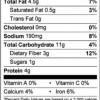
Protein is a nutrient that provides energy for our bodies and is involved in many vital functions, such as repair, maintenance, and immune function. This three-page document discusses the protein requirements for older adults. Written by Amanda L. Ford and Wendy J. Dahl and published by the Food Science and Human Nutrition Department.
http://edis.ifas.ufl.edu/fs290


